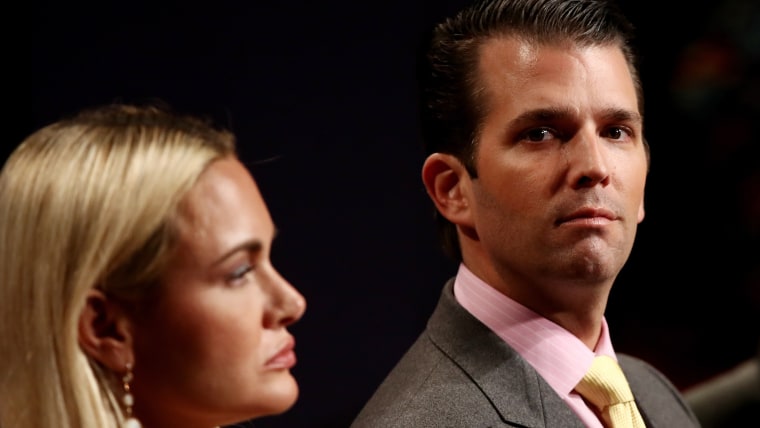In any political controversy, when a relevant player starts dramatically changing his or her story, from one day to the next, it's a sign of real trouble.
In March, for example, Donald Trump Jr. said that during his father's campaign, he never participated in any campaign-related meetings with Russian nationals. Over the weekend, that claim fell apart when the New York Times reported that he met with a Kremlin-connected lawyer, Natalia Veselnitskaya, best known for opposition to the Magnitsky Act, which blacklists suspected Russian human rights abusers.
The meeting took place in June 2016 in Trump Tower, and Trump Jr. was joined by Jared Kushner and Paul Manafort, who was the campaign chairman at the time. None of the players deny that the meeting took place, but Trump Jr. said the discussion focused on an adoption program. This was "the first confirmed private meeting between a Russian national and members of Mr. Trump's inner circle during the campaign."
Soon after Team Trump's story changed again, this time in a statement from the president's outside legal team, suggesting that Democrats were somehow to blame.
Yesterday, the story changed once more. As the Times reported, the meeting wasn't about adoptions.
President Trump's eldest son, Donald Trump Jr., was promised damaging information about Hillary Clinton before agreeing to meet with a Kremlin-connected Russian lawyer during the 2016 campaign, according to three advisers to the White House briefed on the meeting and two others with knowledge of it. [...]The meeting -- at Trump Tower on June 9, 2016, two weeks after Donald J. Trump clinched the Republican nomination -- points to the central question in federal investigations of the Kremlin's meddling in the presidential election: whether the Trump campaign colluded with the Russians. The accounts of the meeting represent the first public indication that at least some in the campaign were willing to accept Russian help.
In a statement, Trump Jr. acknowledged that the meeting took place, and was arranged at the request of an acquaintance he did not name. "After pleasantries were exchanged," he said, "the woman stated that she had information that individuals connected to Russia were funding the Democratic National Committee and supporting Ms. Clinton. Her statements were vague, ambiguous and made no sense. No details or supporting information was provided or even offered. It quickly became clear that she had no meaningful information." He added that "the claims of potentially helpful information were a pretext for the meeting."
Trump Jr. may not fully appreciate the significance of that statement.
One of the key questions in the Trump-Russia scandal is whether, and to what extent, the campaign may have cooperated with Russians during the attack on the American election. For Trump Jr. to join Kushner and Manafort for a meeting with a Kremlin-linked lawyer in the hopes of obtaining damaging information about Hillary Clinton looks quite a bit like collusion.
In his statement, Trump Jr. is dismissive of the meeting, saying Natalia Veselnitskaya had nothing of interest to share. But in the process, he also effectively confirms the accuracy of the report: the point of the meeting was to obtain Clinton-related information from a Russian national.
In other words, Trump Jr., who now appears to have been caught lying about the meeting, had a specific motivation that led him to participate in the conversation: he wanted Clinton-related dirt from Moscow and was willing to accept it during the campaign. That conclusion doesn't require any great leaps; for all intents and purposes, he's admitted as much in print.
The argument from Trump Jr. is, in effect, that he tried to collude with a Russian national and was disappointed when the information wasn't useful -- which sounds more like a confession than a defense.
Postscript: For an American political campaign to solicit assistance from a foreign national isn't exactly legal.
Second Postscript: Let's not forget just how many members of Team Trump, including the president and vice president, insisted there were no pre-election contacts between the top members of the campaign team and Russians.
